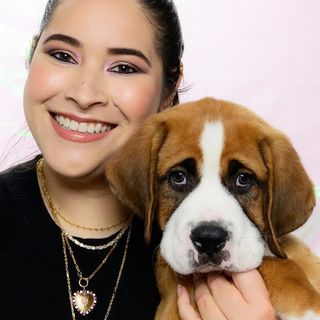The Neonatal Stage begins at birth and lasts until around 14 days old or when puppies’ eyes open. The primary goals during this stage are ensuring puppies are given everything they need to thrive during this fragile period where they are physically developing. This includes daily weight and body checks, changing out their bedding, and gentle, limited handling.
Newborn Puppy Milestones
Healthy neonates spend the majority of their time sleeping, and when awake, they eat and go potty. This is true for newborn puppies being hand-raised or are nursing on mom. It’s key to familiarize yourself with what to see in a healthy newborn so that you can spot signs of a weak or failing newborn more readily.
| 1 WEEK OLD | 2 WEEKS OLD | |
|---|---|---|
| Health | 96° to 98°F temp. ~10% weight gain/day | 96° to 99°F temp. ~10% weight gain/day, Eyes start to open |
| Activity Level | Low; mostly sleeping, otherwise eating | Low; mostly sleeping, otherwise eating |
| Movement | Crawling, snuggling with littermates | Attempts to use front legs, sleep twitches |
| Should not be | Crying frequently | Crying frequently |
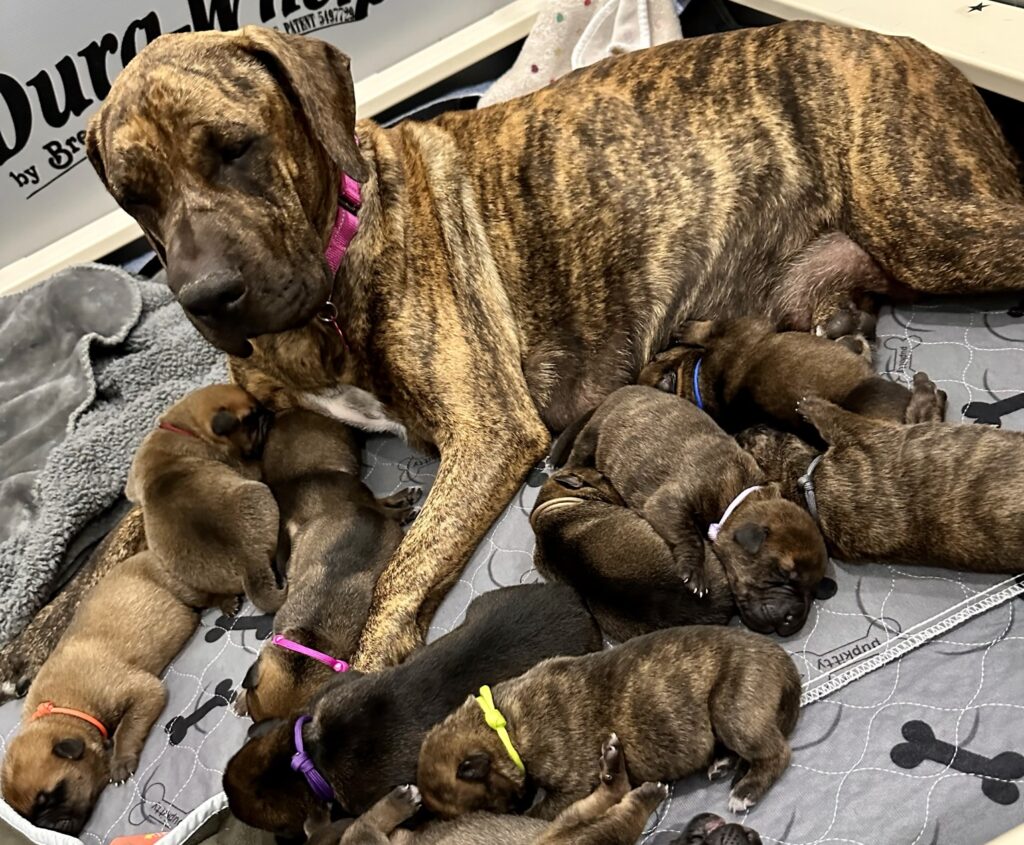
If puppies have a mom, she should spend the majority of her time in the whelping area with her pups to nurse, clean, and provide a source of heat. If mom takes long breaks or shows lack of maternal care, human intervention may be required in order to ensure puppies thrive.
Puppies do not start to regulate their own body temperature until between three and four weeks of age, so during the Neonatal Stage, they require a source of heat, which can be in the form of a heat lamp (safest) or a heating pad. They also need to be able to remove themselves from heat if they’re too warm. Puppies can only warm themselves about 11 degrees higher than the ambient temperature.
They may also cry if they’re “lost” and can’t find their way to mom or a littermate. It is okay to allow them to “struggle” to find mom or littermates to some degree (think a minute or so) but caretakers should “rescue” and help the newborn as necessary, especially the younger they are; the closer they are to walking, the more we can let them try to find their way back.
How to Take Care of Newborn Puppies
To take care of newborn puppies, your focus should be ensuring puppies are properly fed, kept clean, and warm. You must keep track of their weight and ensure that they’re gaining around 10% of their body weight each day while looking for any early signs of failure to thrive by checking body condition of each pup.2 It is important to regularly change out soiled linens and ensure that puppies have a heat source and are kept out of drafts.
You should be familiar with signs of fading puppy syndrome or puppies who may have failure to thrive.
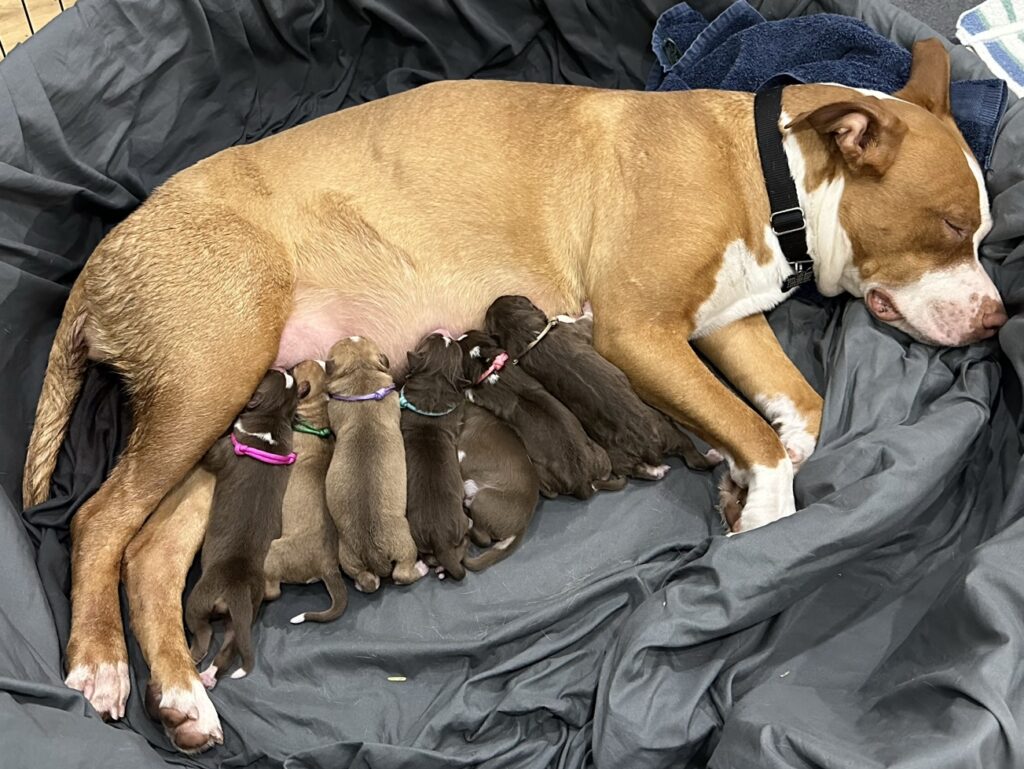
How to Weigh Newborn Puppies
To weigh a newborn puppy, you need a scale capable of weighing in grams and ounces. For smaller-breed puppies (less than 8 oz. at birth), grams are more accurate. For larger-breed puppies (about 16 oz. at birth), weighing in pounds and ounces is sufficiently accurate.
PRO TIP: Puppies will be more comfortable and squirm less (at least, a little less!) with a washcloth or similarly-small blanket on top of the scale tray–just make sure you always zero out the scale after the blanket is on it.
- Weigh at least once every 24 hours. Weights should be taken at approximately the same time.
- If a puppy seems at-risk, weigh at least twice a day so that you can intervene sooner if necessary. At-risk puppies are typically pups who have low birth weights, like a runt, but it may be more than just the smallest of the litter.
- Turn on scale and zero it out to ensure it is ready to take a weight.
- Put puppy onto the scale’s tray and wait for the scale to read out a weight.
- If puppy is very wiggly, stroke it gently and give it time to relax. If it remains squirmy, you can try to guesstimate the weight based on what the scale has read or weigh other puppies and then return to this squirmy pup. You can also try putting the newborn in a bowl (make sure to zero out the scale with the bowl on top, then put the puppy in it) to try to minimize the movement.
- Record the weight. This can be done digitally on a spreadsheet or using pen and paper. You’ll want to make sure to take photos of the recorded weights on paper in case the ink gets smudged (newborn puppies can be messy!).
Product Recommendation: I personally use the Greater Goods Digital Pet Scale, which I have two of myself, and I have purchased several for local rescues to use as well. The scale’s tray is dividable, so I use just one half attached to the scale for newborns and then use the full tray for larger, old puppies. The scale stabilizes well, has a larger enough flat surface to lay down a small blanket, which gives puppies something to grip onto.
How to Keep Newborn Puppies Warm
The easiest way to keep newborn puppies warm is to ensure that the ambient temperature, or the baseline temperature of their environment, is warm enough to prevent chilling. In the first week, the environmental temperature should be between 85° to 90° F (30° to 32° C).3
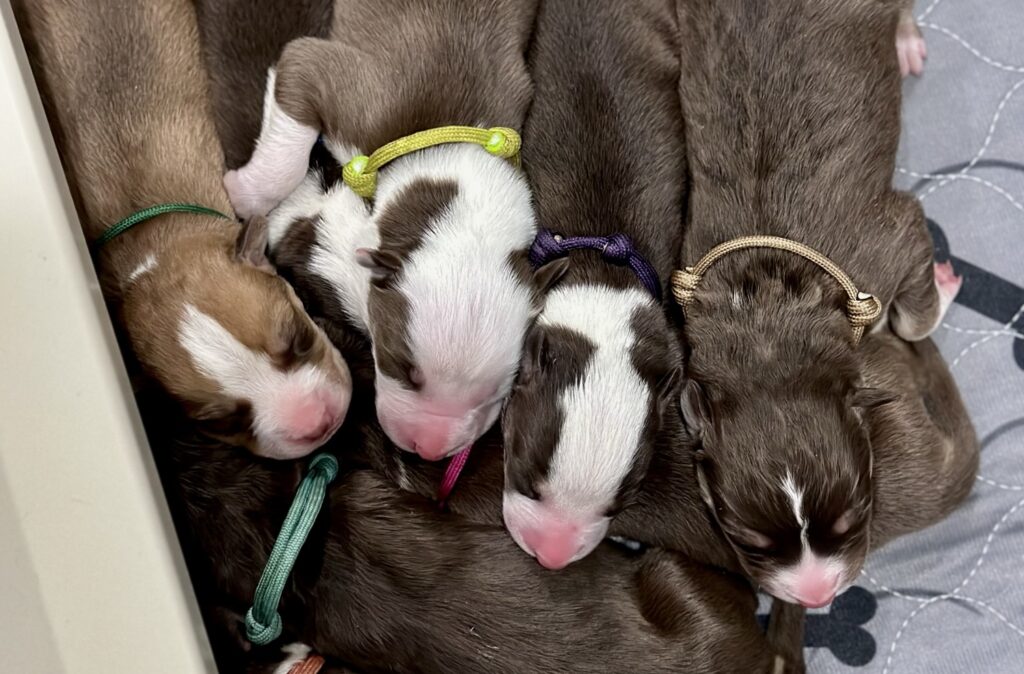
When body temperature falls below 94° F, a gastrointestinal (GI) ileus develops and a chilled puppy will stop trying to nurse. If chilled puppies are not rewarmed before force feeding, regurgitation and subsequent aspiration pneumonia can result.
Fitzgerald, K. T., & Newquist, K. L. (2011). Husbandry of the Neonate. Small Animal Pediatrics, 44–52. https://doi.org/10.1016/B978-1-4160-4889-3.00006-1
The best source of warmth for orphaned neonates is an incubator, but for those who do not have ready access to one or have a mom with nursing puppies, alternatives such as heat lamps, heating pads, warm water bottles, or a space heater for an enclosed room can all be used. Any heat source must be checked often for safety and to ensure that puppies do not get burned.
Typically, a nursing mom will stay in the whelping box the majority of the time, which will help provide a heat source for her pups. Smaller litters may have more difficulty staying warm than larger litters, so you may find that adjustments to the heating elements will need to be made based on litter size.
How to Keep Newborn Puppies Clean
Newborn puppies should be stimulated to defecate and urinate by their mother, who will consume both, and keep her puppies clean. Depending on how good your mom is and how many puppies she has, you may need to change linens one to three times a day to ensure they are clean and dry. If possible, soiled linens should be washed using the sanitize cycle on your washing machine or otherwise at higher heat.
PRO TIP: Layer reusable pee pads or whelping pads so that you can remove a soiled one and have a clean one already under it.
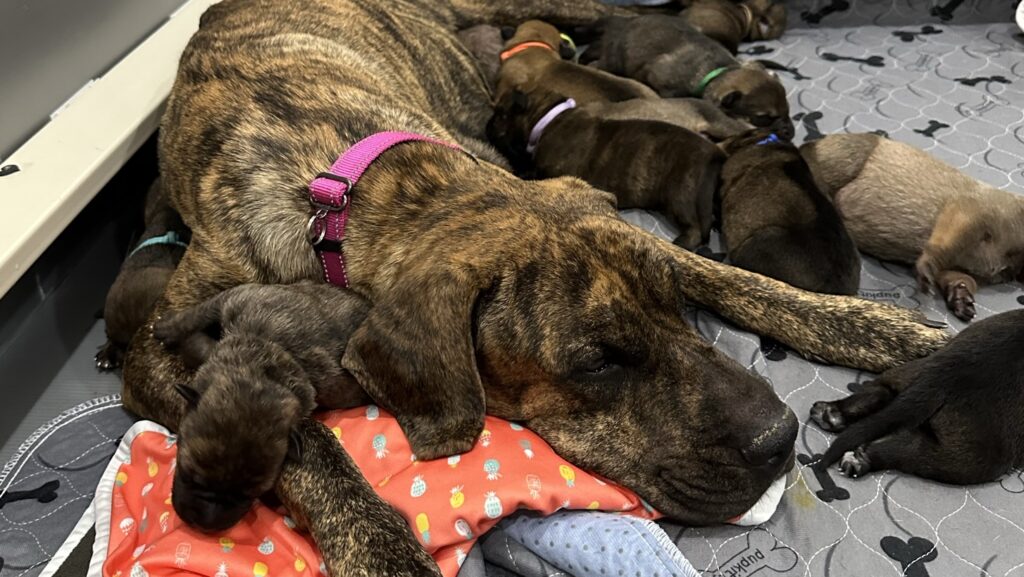
Orphaned newborn puppies will require you to stimulate them to go potty. You will want to be gentle when doing so and do not overstimulate, as this can lead to discomfort of the pup’s genitals. It is imperative that puppies be dried before being returned to their nest to minimize the risk of infection. You may have to change out linens more frequently with newborn puppies as mom is not there to stimulate as often.
Early Handling and Early Neurological Stimulation of Newborn Puppies
We recommend newborn puppies be handled gently but handling should generally be limited to their daily, routine care, such as checking their bodies during weight checks, moving them to change out linens or onto heat, and ensuring that they are well-cared for and healthy.
More structured handling programs exist, such as Early Neurological Stimulation (ENS), but studies have not shown demonstrable benefits. Additionally, there are no minimum nor maximum levels of stress inducement before it may be detrimental, so we must proceed with caution.
ENS evolved from a “Bio Sensor” program used by the US military for working military dogs.4 It gained popularity after a 2009 study1 purported its benefits but that study provided no quantitative evidence for those claims.5
The benefits of ENS have been further studied in 2011, 2022, and 2023 but no studies have been able to confirm the benefits of ENS. At best, simply holding and providing basic care (like weighing daily)2 have a similar effect, which appears to be minimal, and are tasks that are needed to ensure the health of newborn puppies.6
As a result, our recommendation errs on the side of not over-stressing newborn puppies. This is especially important for puppies raised in a shelter or rescue environment, even if they are able to be raised in a foster home, their beginnings (including their environment during pregnancy) may already provide enough trauma to raise cortisol levels.
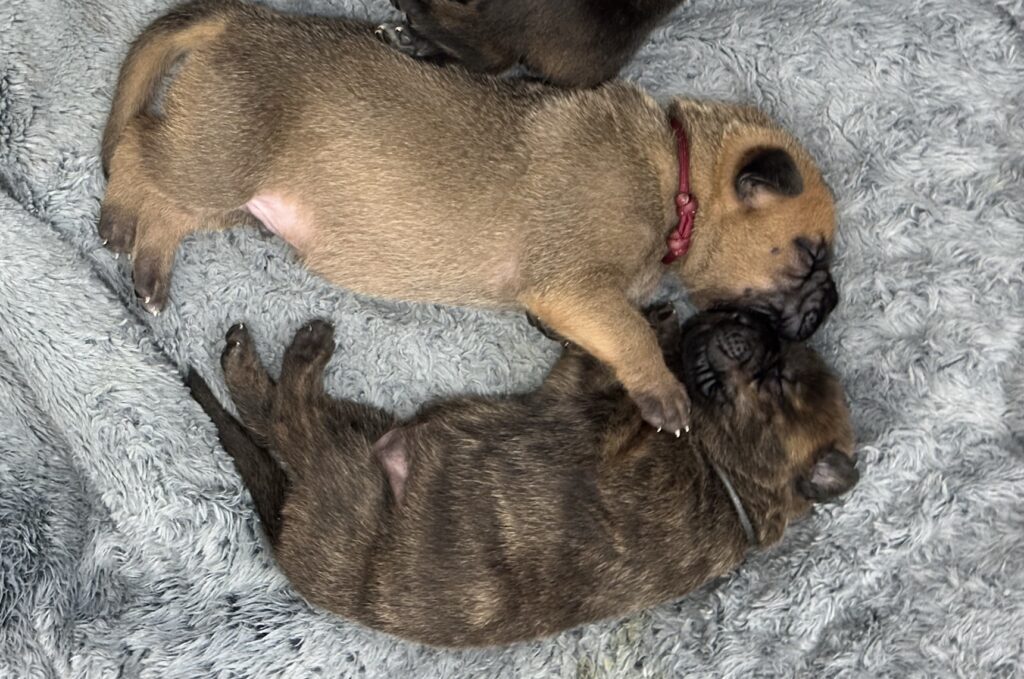
If newborn puppies are orphaned and are taken on as bottle babies, they will go through additional handling through bottle feedings along with stimulation for urination and defecation, but they can be gently stroked and handled more often to mimic the care their mother would have provided. Newborn puppies should spend most of their time sleeping, so additional handling should still be short in duration and limited overall.
Footnotes
- Davidson, A. P. (2022, December 5). Management of the Neonate in Dogs and Cats. Merck Veterinary Manual. https://www.merckvetmanual.com/management-and-nutrition/management-of-the-neonate/management-of-the-neonate-in-dogs-and-cats#Husbandry-in-the-First-Days-of-Life_v14493025 ↩︎
- Simermeyer, L. (2020, July 3). Neonatal nursing care for high-risk puppies and kittens. DVM 360. https://www.dvm360.com/view/neonatal-nursing-care-for-high-risk-puppies-and-kittens ↩︎
- Fitzgerald, K. T., & Newquist, K. L. (2011). Husbandry of the Neonate. Small Animal Pediatrics, 44–52. https://doi.org/10.1016/B978-1-4160-4889-3.00006-1 ↩︎
- Battaglia, Carmen L. 2009. “Periods of Early Development and the Effects of Stimulation and Social Experiences in the Canine.” Journal of Veterinary Behavior 4(5):203–10. doi: 10.1016/j.jveb.2009.03.003. ↩︎
- Boone, Grace et al. “The Effect of Early Neurological Stimulation on Puppy Welfare in Commercial Breeding Kennels.” Animals : an open access journal from MDPI vol. 13,1 71. 24 Dec. 2022, doi:10.3390/ani13010071 ↩︎
- Gazzano A., Mariti C., Notari L., Sighieri C., McBride E.A. Effects of early gentling and early environment on emotional development of puppies. Appl. Anim. Behav. Sci. 2008;110:294–304. doi: 10.1016/j.applanim.2007.05.007. ↩︎






